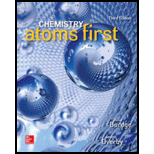
Interpretation: Would the metal alkoxide in sol-gel process be acidic or basic has to be justified
Concept Introduction:
Ceramics are
Ceramics are hard and have high melting points. They are heat insulators.
Ceramics have partly crystalline or cystalline or amorphous structure.
Example: Glass
Ceramics was prepared by a process called sintering. The resulting product was irregular in shape with cracks, spaces and imperfections. Hence, sol-gel method was employed to prepare ceramics of uniform size without much of cracks and gaps.
Want to see the full answer?
Check out a sample textbook solution
Chapter 24 Solutions
Chemistry: Atoms First
- Calculate the pH of a 0.1 M sodium hypoiodite solution.arrow_forwardConsider the series of reactions to synthesize the alum (KAl(SO4 )2 · xH2O(s)) from the introduction. (a) Assuming an excess of the other reagents, from one mole of aluminum Al (s), how many moles of alum will be produced? (b) Assuming an excess of the other reagents, from one mole of potassium hydroxide KOH, how many moles of alum will be produced? (c) Assuming an excess of the other reagents, from one mole of sulfuric acid H2SO4 , how many moles of alum will be produced? (d) If you start the synthesis with 1.00 g of Al, 40.0 mL of 1.50 M KOH, and 20.0 mL of 9.00 M H2SO4 , which of the three will be the limiting reagent? (e) Assuming that the product is anhydrous (that there are no waters of hydration), calculate the theoretical yield of alum, in grams, based on the amounts of reagents in part (d). 3. Consider the nickel salt: (NH4 )2Ni(SO4 )2 ·y H2O (Ammonium Nickel Sulfate Hydrate), where y is the number of coordinated waters. (a) Assuming that the product is anhydrous (y = 0),…arrow_forwardIn what terms can you express the alkaline strength of pearl ash?arrow_forward
- Give a proposal for the purification of Cobalt(II)sulphate CoSO4.7H2Oarrow_forwardWrite a balanced half-reaction for the reduction of nitrate ion NO−3 to gaseous nitric oxide NO in acidic aqueous solution. Be sure to add physical state symbols where appropriate.arrow_forwardExplain the process of standardizing solution of silver nitrate using hydrochloric acid.arrow_forward
- Would you expect an aqueous solution of manganese (VII) oxide to have a ph greater or less than 7.0? Justify your answerarrow_forwardAn aqueous solution of an unknown salt of vanadium is electrolyzed by a current of 2.50 amps for 1.90 hours. The electroplating is carried out with an efficiency of 95.0%, resulting in a deposit of 2.850 g of vanadium. a How many faradays are required to deposit the vanadium? b What is the charge on the vanadium ions (based on your calculations)?arrow_forward
 Chemistry: Principles and PracticeChemistryISBN:9780534420123Author:Daniel L. Reger, Scott R. Goode, David W. Ball, Edward MercerPublisher:Cengage Learning
Chemistry: Principles and PracticeChemistryISBN:9780534420123Author:Daniel L. Reger, Scott R. Goode, David W. Ball, Edward MercerPublisher:Cengage Learning Chemistry: The Molecular ScienceChemistryISBN:9781285199047Author:John W. Moore, Conrad L. StanitskiPublisher:Cengage Learning
Chemistry: The Molecular ScienceChemistryISBN:9781285199047Author:John W. Moore, Conrad L. StanitskiPublisher:Cengage Learning Chemistry & Chemical ReactivityChemistryISBN:9781133949640Author:John C. Kotz, Paul M. Treichel, John Townsend, David TreichelPublisher:Cengage Learning
Chemistry & Chemical ReactivityChemistryISBN:9781133949640Author:John C. Kotz, Paul M. Treichel, John Townsend, David TreichelPublisher:Cengage Learning Chemistry & Chemical ReactivityChemistryISBN:9781337399074Author:John C. Kotz, Paul M. Treichel, John Townsend, David TreichelPublisher:Cengage Learning
Chemistry & Chemical ReactivityChemistryISBN:9781337399074Author:John C. Kotz, Paul M. Treichel, John Townsend, David TreichelPublisher:Cengage Learning Chemistry: Principles and ReactionsChemistryISBN:9781305079373Author:William L. Masterton, Cecile N. HurleyPublisher:Cengage Learning
Chemistry: Principles and ReactionsChemistryISBN:9781305079373Author:William L. Masterton, Cecile N. HurleyPublisher:Cengage Learning Principles of Modern ChemistryChemistryISBN:9781305079113Author:David W. Oxtoby, H. Pat Gillis, Laurie J. ButlerPublisher:Cengage Learning
Principles of Modern ChemistryChemistryISBN:9781305079113Author:David W. Oxtoby, H. Pat Gillis, Laurie J. ButlerPublisher:Cengage Learning





